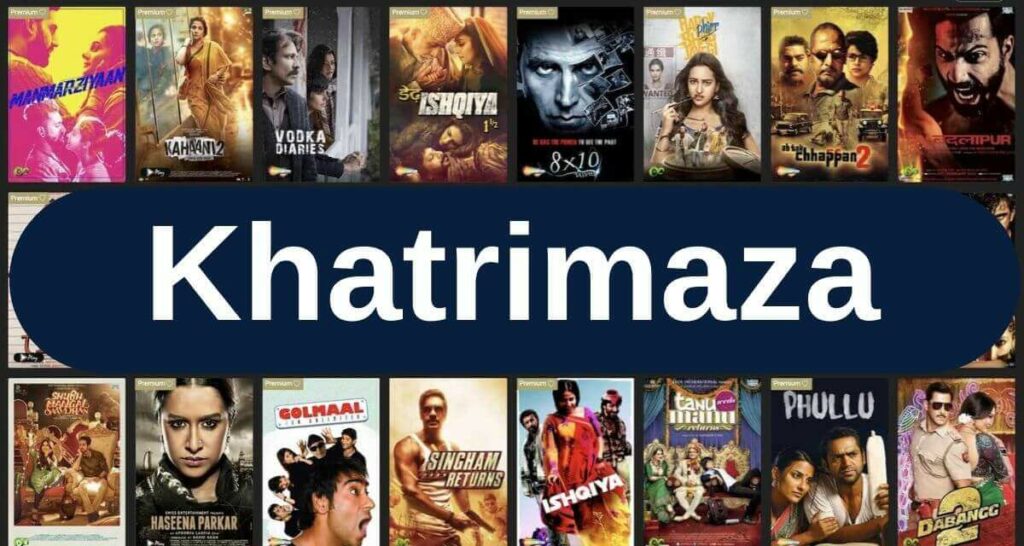Khatrimaza: Stream Movies & TV Shows - Latest Releases & More!
Is the allure of readily available entertainment truly worth the potential risks associated with accessing it through unofficial platforms? The rise of platforms like Khatrimaza, offering seemingly unlimited access to movies and TV shows for free, presents a complex dilemma that challenges the very fabric of the entertainment industry and the legal rights of content creators.
The digital landscape has transformed the way we consume media, offering unprecedented convenience and accessibility. Platforms like Netflix, Amazon Prime Video, and Disney+ have revolutionized entertainment, providing vast libraries of content at a relatively affordable price. Yet, alongside these legitimate services, a parallel universe of unauthorized streaming and downloading platforms has emerged, promising the latest blockbusters and classic films without the financial burden. This is where entities like Khatrimaza, a name synonymous with free access to movies and TV shows, come into play.
Before delving deeper into the complexities surrounding platforms such as Khatrimaza, let's examine the official, licensed streaming services. These platforms offer a multitude of benefits: legal content, high-quality viewing experiences, and a commitment to supporting the creative industries. Subscription fees contribute directly to the production of new films and television shows, ensuring the continued growth and innovation of the entertainment landscape. Furthermore, these services prioritize user experience with features such as curated recommendations, multiple device compatibility, and offline viewing options.
- Discover Streaming Your Guide To Movies Tv Shows In India Beyond
- Kannada Movies More Your Guide To Safe Streaming Alternatives
Conversely, platforms offering pirated content often struggle to compete with the quality and reliability of licensed services. Users of these platforms may encounter low-quality streams, intrusive advertisements, and the constant threat of malware or viruses. Moreover, the act of accessing or downloading copyrighted content without permission constitutes copyright infringement, with legal consequences that can range from cease-and-desist letters to substantial fines.
The appeal of Khatrimaza and similar platforms is undeniable. The promise of free access to a vast library of movies and TV shows, including Bollywood, Hollywood, South Indian films, and even animated content, is enticing, particularly for those seeking budget-friendly entertainment. The platforms often boast a wide selection of titles, including the latest releases and classics, often available in multiple languages and with various subtitle options. However, the seemingly free offerings mask a far more complex reality.
The legal implications of using platforms like Khatrimaza are significant. These platforms operate outside of the law, distributing copyrighted material without permission from the copyright holders. This constitutes copyright infringement, a serious offense that can lead to legal action. Copyright laws are designed to protect the rights of creators and incentivize the production of new content. By accessing pirated material, users are directly contributing to the erosion of these rights and potentially harming the very creators whose work they enjoy.
- Discover The Best Movie Streaming Download Sites 20242025
- 7starhd Latest Movies Downloads Alternatives Your Guide
Furthermore, the security risks associated with accessing pirated content are substantial. Platforms like Khatrimaza often serve as breeding grounds for malware, viruses, and other malicious software. Users who download or stream content from these sites risk exposing their devices to these threats, potentially compromising their personal information and damaging their hardware. The lack of security measures and the absence of oversight make these platforms a haven for cybercriminals.
The impact on the entertainment industry is another critical consideration. Platforms like Khatrimaza undermine the financial viability of film and television production. When content is freely available through unauthorized channels, the revenue streams for content creators are drastically reduced. This can lead to fewer resources for producing new films and shows, stifling creativity and innovation. It can also affect the employment of countless individuals working in the film and television industries, including actors, writers, directors, editors, and technicians.
The user experience on these platforms is often far from ideal. Users may encounter buffering issues, low-quality streams, and intrusive advertisements that disrupt the viewing experience. The lack of customer support and the absence of a guarantee of content availability further diminish the value proposition of these platforms. In contrast, licensed streaming services offer a superior viewing experience, with high-quality streams, ad-free viewing options, and responsive customer support.
The availability of free content can be appealing, but it's crucial to weigh the potential benefits against the associated risks. The legal consequences, security threats, and the impact on the entertainment industry are all significant factors to consider. By choosing to support legitimate streaming services, users can enjoy high-quality content while contributing to the long-term sustainability of the entertainment landscape.
The content offered on Khatrimaza typically encompasses a broad spectrum, including Bollywood movies, which have a massive following, especially in India and among the Indian diaspora worldwide. The platform also claims to offer a selection of Hollywood movies, catering to international audiences. South Indian films, known for their vibrant storytelling and unique cultural nuances, are also often present. Additionally, animated movies, a perennial favorite across age groups, feature prominently.
Let's use the hypothetical individual as an example, if the topic was a person related topic.
| Attribute | Details |
|---|---|
| Name | [Replace with Hypothetical Person's Name] |
| Date of Birth | [Insert Date] |
| Place of Birth | [Insert Location] |
| Nationality | [Insert Nationality] |
| Education | [Insert Highest Level of Education and Institution] |
| Career | [Insert Career Path and Key Roles] |
| Professional Achievements | [List Key Accomplishments, Awards, and Recognition] |
| Known For | [Specific Fields, Contributions] |
| Links | [Link to Source] |
The platform's user interface, if considered, has been designed to facilitate a seamless browsing experience. It often employs a categorization system to help users quickly locate desired content. This usually involves organizing movies and shows by genre (e.g., romance, action, comedy), language, release year, and other relevant parameters. These categorization systems, however, are usually not as sophisticated as those on legitimate streaming platforms.
If the topic were about a company, let's showcase the use of a table with related information.
| Attribute | Details |
|---|---|
| Company Name | [Insert Company Name - e.g., Hypothetical Tech Corp] |
| Industry | [Insert Industry - e.g., Technology, Entertainment] |
| Founded | [Insert Date] |
| Headquarters | [Insert Location] |
| Key Products/Services | [Insert Details] |
| Mission Statement | [Insert Mission Statement] |
| Key People | [Insert CEO, Founders] |
| Website | [Company Website] |
In contrast, legitimate streaming services are dedicated to offering a premium entertainment experience. These platforms invest heavily in content acquisition, production, and distribution. They ensure high-quality streaming, regular updates, and a secure environment, free from malware and intrusive advertisements. This commitment to a superior user experience is a key differentiator.
Regarding the legal context, platforms like Khatrimaza are inherently problematic. They operate outside the legal framework and facilitate copyright infringement. The distribution of copyrighted material without authorization is a violation of copyright laws. This has a direct impact on content creators, the entertainment industry and the financial viability of producing quality films and television shows. The very act of streaming or downloading content from these platforms carries legal ramifications that users should be aware of.
The digital realm is always evolving, and with it, the tactics employed by platforms like Khatrimaza. The evolution of content delivery methods is a constant game of cat and mouse between copyright holders and platforms offering unauthorized access. In response to enforcement actions, these platforms frequently change their domain names and hosting providers. This makes it challenging to track and shut them down permanently. Furthermore, these platforms may adopt various methods to bypass technological protections and geographical restrictions. This includes using proxies and VPNs, as well as employing sophisticated techniques to remove watermarks and other copyright protections.
The increasing proliferation of illegal streaming and downloading platforms poses challenges. They undermine the foundations of a sustainable entertainment ecosystem. While the allure of free access is strong, it is essential to recognize the underlying legal, ethical, and security issues. The long-term health of the entertainment industry, the protection of creative rights, and the safety of individuals all depend on the choices we make in how we consume media.
The future of the entertainment industry is intricately linked to the choices that consumers make. As the digital landscape continues to evolve, it is crucial to support legitimate streaming services and promote the value of copyrighted content. The transition towards a model of ethical consumption benefits creators, protects users, and ensures the continued availability of diverse and high-quality entertainment experiences. Choosing to access content through legal channels not only supports the entertainment industry but also ensures a safe and enjoyable viewing experience.
Article Recommendations
- Download Bollywood Movies In Hd Your 2023 Guide
- Movierulz Risks Alternatives Latest Updates You Need To Know



Detail Author:
- Name : Nicklaus Olson
- Username : josiane.quigley
- Email : ariane.schaden@abbott.com
- Birthdate : 1984-01-21
- Address : 378 Vida Forges Gerardhaven, NJ 58993-9345
- Phone : 1-910-723-7546
- Company : Wintheiser LLC
- Job : Art Teacher
- Bio : Atque qui id qui et quisquam et. Officiis nemo provident fugit ullam excepturi repudiandae. Non quia voluptates perferendis incidunt saepe ipsum excepturi.
Socials
linkedin:
- url : https://linkedin.com/in/nikko.wisozk
- username : nikko.wisozk
- bio : Quam autem accusamus dolorem quo mollitia saepe.
- followers : 4202
- following : 1362
facebook:
- url : https://facebook.com/nikko_id
- username : nikko_id
- bio : Omnis impedit nihil quas omnis ea.
- followers : 4815
- following : 2403